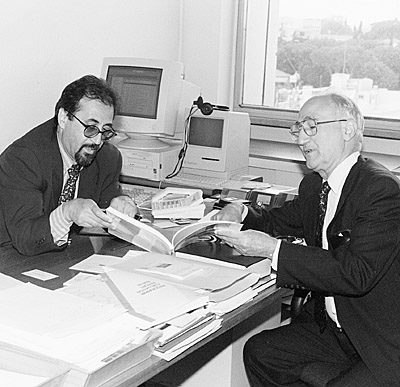


Lors du Sommet mondial de l'alimentation de 1996, les pays membres des Nations Unies se sont engagés à déployer - au cours des 20 prochaines années - des efforts pour diminuer de moitié le nombre de personnes sous-alimentées, qui sont aujourd'hui 800 millions.
M. Ramez Mahjoory, de la Faculté d'agriculture internationale et de pédologie de l'Université d'État du Michigan, a passé une année au sein de la FAO dans le cadre du Programme d'experts invités des établissements universitaires et instituts de recherche. Parmi les nombreuses tâches qui lui ont été confiées, l'expert invité a établi un descriptif régional de l'état des terres et des ressources en eau en Afrique, élaboré un profil du pays pour le Bangladesh et participé à une mission conjointe FAO/Banque mondiale au Ghana.
En la Cumbre Mundial de la Alimentación de 1996, los países miembros de las Naciones Unidas se comprometieron a aunar sus esfuerzos para que en las dos décadas próximas se reduciera a la mitad el número de personas desnutridas frente a los más de 800 millones existentes en la actualidad.
Ramez Mahjoory, de la Facultad de Agronomía y Edafología Internacional de la Universidad Estatal de Míchigan, pasó un año en la FAO becado por el Programa de expertos visitantes de instituciones académicas y de investigación. Entre sus múltiples tareas preparó un perfil regional sobre la situación de los recursos de tierras y aguas en África, trabajó en un perfil nacional para Bangladesh y participó en una misión FAO/Banco Mundial a Ghana.
![]()
Food insecurity remains a persistent and ever growing problem for a large proportion of the population in developing countries, particularly in sub-Saharan Africa. At the 1996 World Food Summit, member countries of the United Nations pledged efforts to halve the present number of more than 800 million undernourished people within the next two decades. The dimensions of the food security problem depend on population growth rates, changes in per caput income and the availability of land, water and other resources. In the developing world, the constant removal of plant nutrients and the adoption of survival strategies by poor farmers has aggravated productivity decline, soil losses and widespread land degradation.
These global environmental problems, together with the loss of biological diversity and climate change, have received increasing attention from the international community in the last decade. New debates have opened up on the multifunctional role of soils, not only as a resource and base for food production but also as a biological reserve and carbon sink. If there are to be real prospects for increased food production, while maintaining the sustainability of resources and protecting the local and global environment, a more "holistic" approach to soil fertility management and conservation is now needed. Interdisciplinary research programmes which are centred on the real-life situations and needs of local populations and which respond to the sometimes conflicting demands and interests of all stakeholders are called for.
Africa is the continent with the greatest proportion of potentially arable land and is the focus of agricultural and food production development. But agricultural growth in the continent has to be achieved with methods that preserve the productivity of the earth's already strained natural resources. Declining land productivity is a result not only of the loss of soil

Ramez Mahjoory (right) with Parviz Koohafkan at FAO headquarters |
Ramez Mahjoory, from Michigan State University's Faculty of International Agriculture and Soil Science, spent a year at FAO under the Visiting Experts from Academic and Research Institutions Programme. Among his many assignments, he prepared a regional profile on the state of land and water resources in Africa, worked on a country profile for Bangladesh and participated in an FAO/World Bank mission to Ghana.
"Georeferenced information about land resources on an appropriate scale is scarce, not only in Ghana but also in other parts of Africa. This, combined with frequently poor links between research institutes, NGOs, policy-makers and development projects has considerably limited the targeting and adaptation of technologies to site-specific biophysical and socio-economic environments," he comments.
As is true of the work of other visiting scientists, Mahjoory's work will help to put FAO at the forefront of emerging scientific and technical issues related to sustainable agriculture and rural development and the environment. At the same time, the Visiting Experts Programme helps the scientific community to understand better the needs of farmers in developing countries and to prepare future generations for the challenges ahead. Mahjoory would like to see interaction between FAO and academic institutions continuing after the end of individual scientists' assignments, which last for a maximum of 12 months. He also suggested that FAO experts should undertake study-leave in universities and research institutions.
Parviz Koohafkan, Chief of the Land and Plant Nutrition Management Service of FAO's Land and Water Development Division, agrees: "FAO's strength lies in its multidisciplinary teams and extensive knowledge of developing countries, but our present workload can make it difficult to keep fully up to date with the latest research. Universities and research institutions are at the forefront of method and concept generation and interaction with them can bring added value to our Organization. The Visiting Experts Programme helps FAO implement the best programmes and practices."
Mahjoory and Koohafkan would both like to see a "triangular flow" between specific universities, agricultural research centres and FAO. "In the next millennium, closer interaction between universities, agricultural research institutes and development agencies such as FAO will help to achieve the goals of food security and sustainable agricultural development," says Mahjoory.